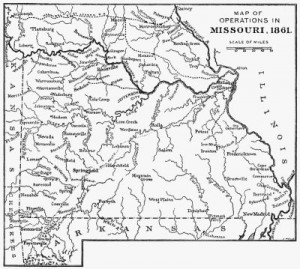Midwesterners’ loyalties are divided, the region having for years been a lightning rod as the nation fought over whether or not slavery should be allowed in the region. Anti-slavery sentiment ultimately won the political battle, but the tension in the region ultimately had contributed to the coming of war. While the state of Missouri remains in the Union, and most citizens are loyal to the United States, Confederate sympathies are easily found.
St. Joseph, Missouri–in Buchanan County–is located near the Kansas border, and is home to many Confederate sympathizers. Southern sentiment is strong enough that the city has been under martial law since fall 1861, guarded by Union troops. Citizens have to obtain a pass to leaver or enter the city. Many Southerners, having refused to sign an oath of loyalty to the United States, now sit in jail.
The Baptist church of St. Joseph, comprised of Southern transplants, endures during Union occupation. This week, however, they are surprised upon entering their sanctuary to worship.
The Baptist brethren and the sisterhood of St. Joseph, we learn from the Herald, were very much annoyed last Sunday, on entering their church, to find the graceful folds of the red, white and blue overshadowing the pulpit. But few of the congregation remained, so great was their indignation, and the chair would not go on with the performance. They did not venture on taking the buntling [sic] down …
Martial law remains in place in St. Joseph for the remainder of the war. Divided sentiment is such that Buchanan County contributes some 2,000 soldiers each to the United States and Confederate armies during the war years. Feelings of animosity run deep, and St. Joseph struggles to recover its footing for many years following the great conflict.
Sources: “American Civil War in St. Joseph, Missouri” (link); Daily Times, Leavenworth, Kansas, August 21, 1862, p. 4, c. 1 (link)



